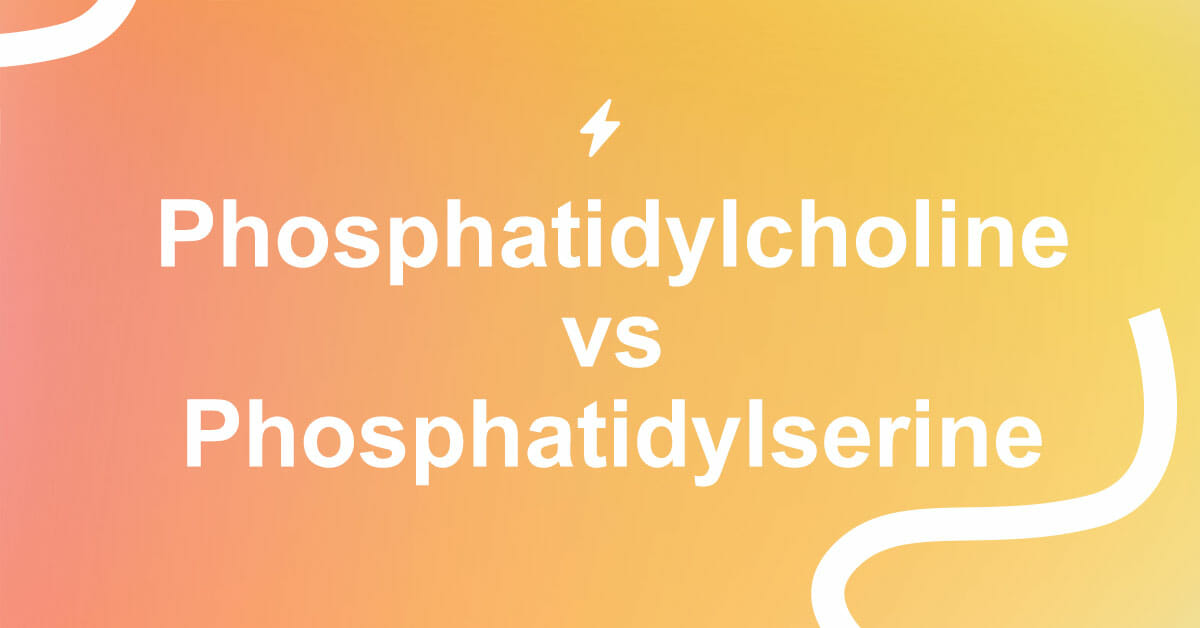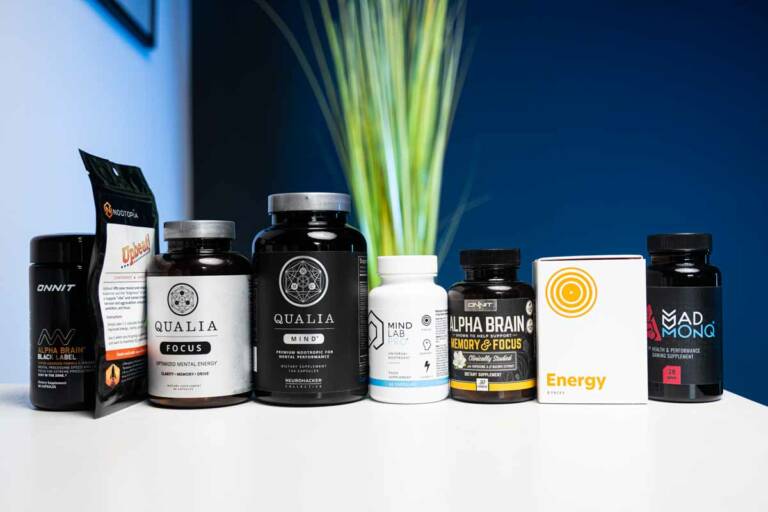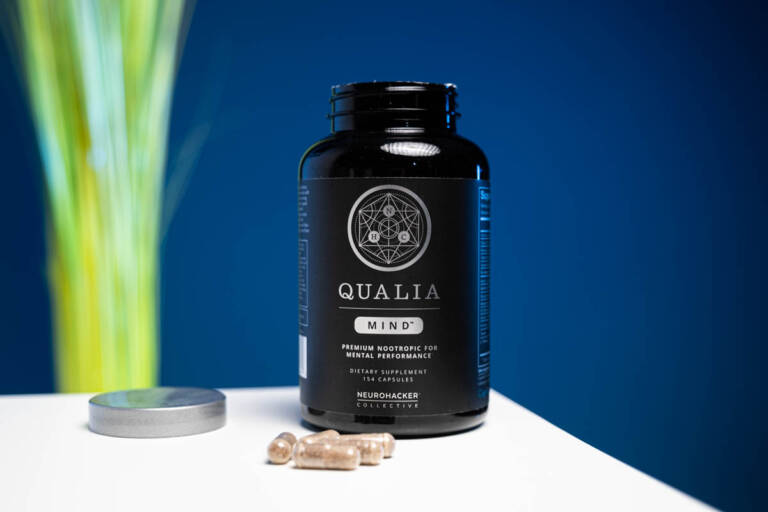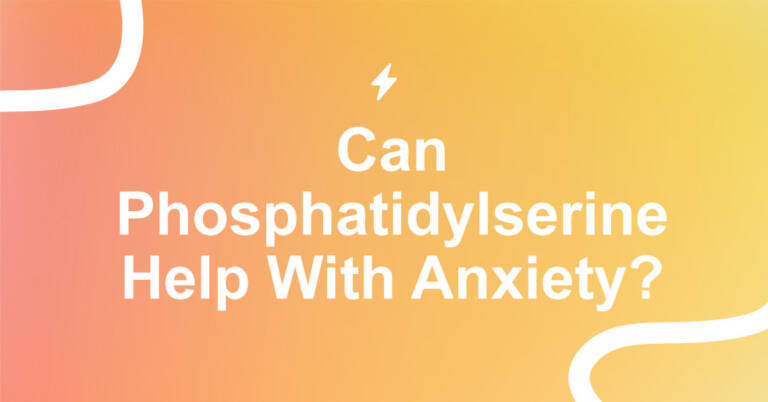Those of us interested in brain health have come across many strange-sounding names. Phosphatidylcholine and phosphatidylserine are no exception. These two compounds may be a mouthful to pronounce, but their effects on the human brain and overall health are worth noting.
While both these compounds have different functions and specific benefits, they overlap in purpose. Keen to learn their health benefits, and how these two compounds fare against each other in brain and overall health?
This phosphatidylcholine vs phosphatidylserine review will help settle the score for you.

What Is Phosphatidylcholine?
Phosphatidylcholine (PC) is the most abundant phospholipid in the body and a major component of cellular membranes. Some of the important roles it plays include nerve signaling, memory, maintaining cell structure, and fat metabolism.
It does this through supporting neurotransmitters and the health of your liver. PC forms the structural skin that surrounds your cells, and is the most abundant in a class of phospholipids known as “essential phospholipids.” [*]
Another critical function of PC is that it’s used to synthesize acetylcholine – an important neurotransmitter in the brain. The body makes this chemical which is important for memory and other functions in the body.
PC is a major component of cell membranes and pulmonary surfactants. This complex and highly active material, composed of lipids and proteins is found in the fluid lining of the alveolar surface.
It’s also more commonly found in the outer leaflet of a cell membrane. [*] PC is naturally produced by the liver, but your liver may not produce enough to fully optimize your health.
Wondering what the benefits of phosphatidylcholine are? Let’s find out!
Phosphatidylcholine Benefits
While phosphatidylcholine may not be widely known, this nutrient is important for every cell in the body. This is why this compound is key to your health.
For example, PC is known to support liver function. According to one study, for example, PC helped reduce lipids that can lead to a fatty liver, which is caused by a high-fat diet in mice. [*]
In another study, it was found that PC helped prevent the accumulation of fat in the liver. [*]
Since PC makes up 90 percent of the phospholipids in the gastrointestinal (GI) mucus layer, it helps protect the intestinal wall from damage and promotes overall gastrointestinal health. [*]
For example, studies show that people with ulcerative colitis, an inflammatory bowel disease, have decreased levels of PC in their intestinal mucus. [*]
If you know the gut-brain connection, you can imagine how important PC is for cell to cell communication, and that it’s a great way to optimize your overall health.
PC has many benefits for brain health including helping prevent cognitive decline, boosting mood, and improving cognitive performance.
Let’s take one example of how PC is important for brain health. In one study, researchers found that PC supplementation increased the neurotransmitter acetylcholine, which may help improve memory. [*]
As previously mentioned, acetylcholine is a critical neurotransmitter. For example, it plays a key role in your health and influences cognition, sleep, mood, attention, blood pressure, and more. [*] [*]
In a 2017 study, researchers found that levels of phosphatidylcholine are directly linked to Alzheimer’s disease. [*] This isn’t surprising since as we get older, this compound slowly gets depleted.
Some call PC the “Miracle Molecule” for its anti-aging abilities.
How To Add PC To Your Diet
Considering its important functions, adding PC to your diet can help promote a healthy brain and a healthy body. PC is synthesized in the body partly through the choline we consume from our diet. The best dietary sources of PC include:
Whole eggs
Fish
Organ meat
Beef
Almonds
Chicken
Turkey
Peanuts
Soybeans
For targeted brain support and overall health, you can also take a phosphatidylcholine supplement. In addition to consuming it through food, supplementing with PC will provide additional health benefits that optimize brain functions.
What Is Phosphatidylserine?
Phosphatidylserine (PS) is a fatty substance called a phospholipid. It’s produced by the body and is found in many of your body’s cells. Phosphatidylserine is key for healthy nerve cell membranes and myelin; a lipid-rich material that insulates your nerves.
This fatty substance is vital in your spinal cord and brain. How important? Phosphatidylserine helps in brain function and supports the transmission of messages between the brain’s nerve cells. PS accounts for up to 15 percent of all phospholipids in the cerebral cortex.
Phosphatidylserine – which covers and protects every cell in the body – is an essential component of healthy nerve cell membranes.
This nutrient is key to the maintenance of the cell’s internal environment and participates in signal transduction, cell growth regulation, and cell-to-cell communication. [*]
Phosphatidylserine crosses the blood-brain barrier (BBB). Studies show that not only is this fatty substance efficiently absorbed in humans, but it “safely slows, halts, or reverses biochemical alterations and structural deterioration in nerve cells.” [*]
This important nutrient is known to support cognitive functions such as the formation of short-term memory and the consolidation of long-term memory. Phosphatidylserine also supports our abilities to:
Create new memories
Retrieve memories
Learn and recall information
Focus
Reason and solve problems
Communicate
That’s not all! Phosphatidylserine also helps with language skills and supports locomotor functions. While you can get phosphatidylserine in foods, it’s also available as a supplement form called phosphatidylserine complex.
While phosphatidylserine is a single nutrient, the phosphatidylserine complex is composed of multiple compounds. Naturally, their specific benefits on cognitive performance and overall brain health vary.
Phosphatidylserine Benefits
As mentioned a little earlier, phosphatidylserine has numerous benefits for brain health. As this important nutrient plays a huge role in transmitting messages, PS is shown to protect against cognitive decline.
In one study, for example, participants with a poor memory who consumed PS daily for six months showed significant improvement in recall. [*]
Other studies show PS as a mood booster. This is important as it’s believed that people with a positive attitude are much better at learning and remembering than those with a negative outlook. [*]
As a mood booster, phosphatidylserine is also beneficial for depression and anxiety. In a 2015 study, participants over the age of 65 took supplements containing phosphatidylserine and the omega-3 fatty acids DHA and EPA.
After taking this three times a day for 12 weeks, researchers noted that the scores on depression had improved. [*]
Another benefit of phosphatidylserine is its ability to help with muscle soreness. In a study published in Sports Medicine, it was found that phosphatidylserine decreased muscle soreness in people who exercise.
In addition, the study found that phosphatidylserine helped protect against the increase of cortisol, a stress hormone that can occur with overtraining. [*]
How To Add PS To Your Diet
You can enjoy the amazing health benefits of phosphatidylserine from dietary sources or by taking PS supplements. As far as food is concerned, the following foods contain phosphatidylserine:
Organ meats
White beans
Soybeans
Though not in great quantities, eggs and some vegetables also contain phosphatidylserine.
Phosphatidylserine Vs Phosphatidylcholine
There are a few similarities and differences between these two important nutrients. Let’s begin with the similarities.
Phosphatidylcholine and phosphatidylserine are both phospholipids (fats). They help form the membrane of cells, which allows both fat and water-soluble molecules to pass through.
Phospholipids help with neurotransmitter production, which is how nerves communicate with each other and the rest of the body. As you can imagine, phospholipids are critical to healthy brain function. In addition, both PC and PS protect every cell in the body.
What about their differences? If you recall, we mentioned in the intro how these two fatty substances have different functions, but their purposes overlap.
For example, PC enhances the functionality of brain cells whereas PS promotes the health and longevity of brain cells and cell membranes.
In other words, the goal of both these important nutrients is to support brain health and cognition.
Another difference to point out is while PC is naturally produced by the liver, PS is a naturally occurring chemical found in the brain.
Whether you take them as supplements or in food form, consuming these powerful fatty substances can do wonders for you. If you’re not sure which one to go for, ask yourself what’s the most important function for you.
For instance, if you’re looking for something that focuses on the functionality of your brain cells rather than their longevity, then PC is the right choice for you. If on the other hand, you want something that focuses on the health and longevity of your brain cells (without enhancing their functionality) then PS is the right choice for you.
Keep in mind that many people take both of these nutrients. Again, this all depends on your specific needs, as well as your diet. It may be that you need more PC than PS or the other way around.
Considering all these factors may seem difficult, but not as difficult as pronouncing these two words!






